India is a big player in vaccine production – but companies are warning of supply problems.
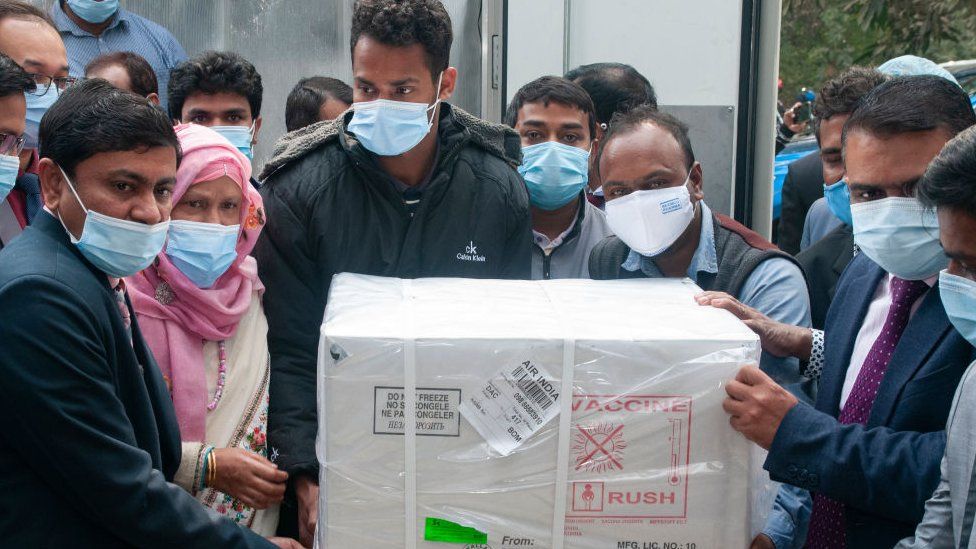
image copyrightGetty Images
India, one of the world’s largest producers of coronavirus vaccines, is struggling to meet its export commitments.
Its largest manufacturer says doses intended for the UK could be held up, and a big order to supply Nepal has also been put on hold.
The Serum Institute of India (SII) – which produces Novavax and AstraZeneca vaccines – recently raised concerns about raw material shortages.
Its chief executive, Adar Poonawalla, attributed this to US export bans on specific items needed to make vaccines, such as specialised bags and filters.
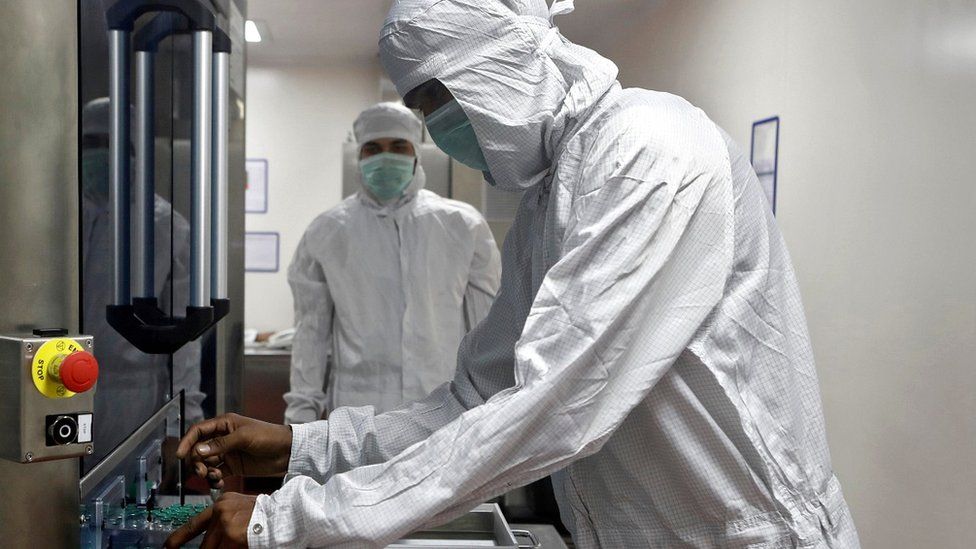
image copyrightAFP
The firm said it has also faced difficulties importing cell culture media, single-use tubing and specialised chemicals from the US.
“The sharing of these…raw materials is going to become a critical limiting factor — nobody has been able to address this so far,” said Mr Poonawalla.
The SII has written to the Indian government asking it to intervene to ensure the uninterrupted manufacture and supply of vaccines globally.
Another Indian manufacturer, Biological E, which is producing the Johnson & Johnson vaccine, has also raised concerns about possible shortages affecting vaccine production.
Mahima Datla, the company’s chief executive, recently said US suppliers were “reluctant to commit that they will stick to their delivery timelines”.
President Biden has asked his administration to identify potential shortfalls in materials required for vaccine production.
He has invoked the Defense Production Act (DPA), legislation from the 1950s which gives the US president powers to mobilise the domestic economy in response to emergencies.
This allows the US to restrict the export of such products as vaccine supplies, to enable it to ramp up its own production.
President Trump also used these powers to restrict the export of some personal protective equipment (PPE) last year.
Representatives of various global vaccine makers raised concerns in early March, warning that:
- Export restrictions from key suppliers could affect global production
- Some items lack standardisation and are highly specialised
- Replacement with substitutes sourced from elsewhere could take up to 12 months
Dr Sarah Schiffling, an expert on vaccine supply chains at Liverpool’s John Moores University, says the pharmaceutical supply chain is very complex.
“Even when demand is very high, new suppliers can’t spring up as quickly as they would in some other industries, or at least those new suppliers would not be trusted.”
She also says that the US measures are as much a reaction to existing global shortages, as they are the cause of them.
“To some degree, shortages would be unavoidable for materials needed for any kind of product that is suddenly in demand around the world,” she says.
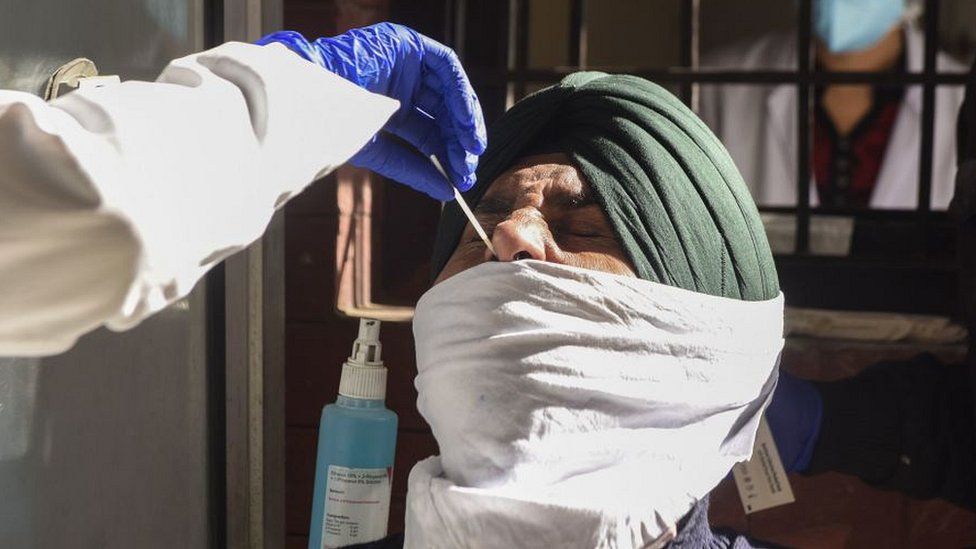
image copyrightGetty Images
There are currently two vaccines approved in India – the Oxford-AstraZeneca vaccine (known locally as Covishield) and Covaxin, developed in Indian laboratories.
Since early January, nearly 130 million doses of Covishield from the SII have been either exported or used domestically.
Indian pharmaceutical companies have been ramping up production by adding new facilities or converting existing production lines for some months now, both to meet domestic demand and meet global supply requirements.
The Serum Institute said in January it could at that point turn out between 60 and 70 million vaccine doses a month – this includes Covishield and the US-developed Novavax (not yet licensed for use).
Getty Images
-
SIICovishield, Novavax
-
Bharat BiotechCovaxin, CoraVax
-
Biological EJohnson & Johnson
-
Zydus CadilaZyCoV-D
-
Hetero BiopharmaSputnik V
-
Dr Reddy’s LabSputnik V
Source: Media reports
The SII told the BBC back then it was aiming to boost production to 100 million doses a month from March – but when we checked with them recently, production was still at 60 to 70 million doses, and had not increased.
The company did not clarify if it already had stockpiles of the vaccines it produces, and how much of its production has been earmarked for domestic use only.
The Indian government began its vaccination programme on 16 January, and so far the country has inoculated over 37 million people amid fears of a possible second wave.
Infections have been increasing in some parts of the country.
The authorities aim to administer 600 million doses within seven months – that’s about 85 million doses a month.
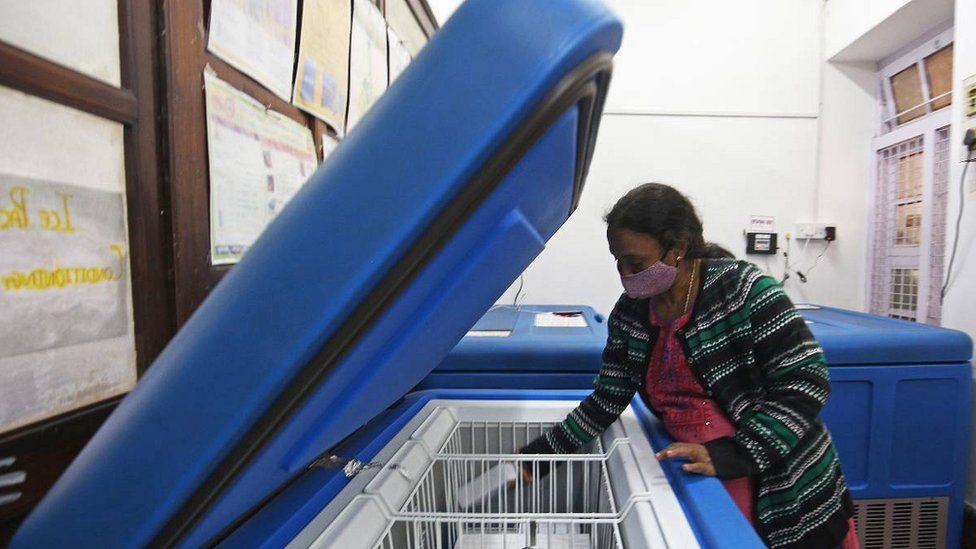
image copyrightEPA
So far, the SII has an agreement to supply 100 million doses to the Indian government, with another firm, Bharat Biotech, supplying 10 million doses.
India also has licensing deals with the Russian Gamaleya Research Institute to produce 200 million doses of the Sputnik vaccine.
These will be produced by Indian manufacturers, for both the Indian market and for export.
The SII chief, Adar Poonawalla, indicated in January that official approval for Covishield was granted on the understanding that company prioritise Indian domestic needs.
However, the Indian government subsequently made clear there were no restrictions on exports, after Bangladesh queried if a contract to supply Covishield would be honoured.
India’s SII also has commitments to the UN-backed Covax initiative to help low and middle-income countries secure access to vaccines.
Last September, the SII agreed to supply 200 million doses to Covax – either the AstraZeneca or Novavax vaccines.
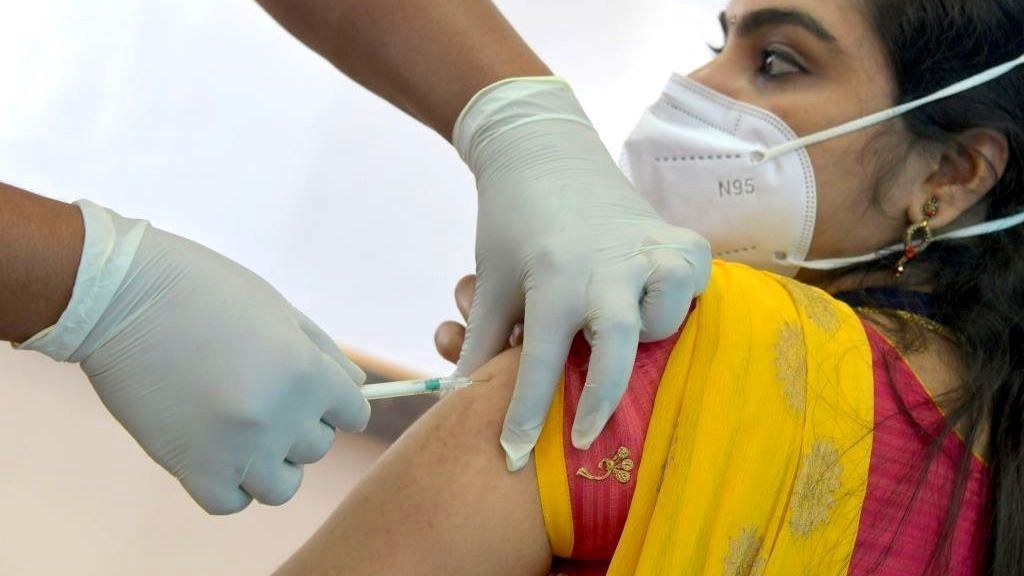
image copyrightAFP
The SII has also made bilateral commercial deals, amounting to nearly 900 million doses of AstraZeneca vaccine, and 145 million doses of Novavax, according to UN data.
The Indian government has also donated vaccines to a number of countries, with a particular emphasis on its neighbours in South Asia.
It’s so far made more vaccine donations than China with over eight million doses given away, compared with 7.3 million, according to UN data.
